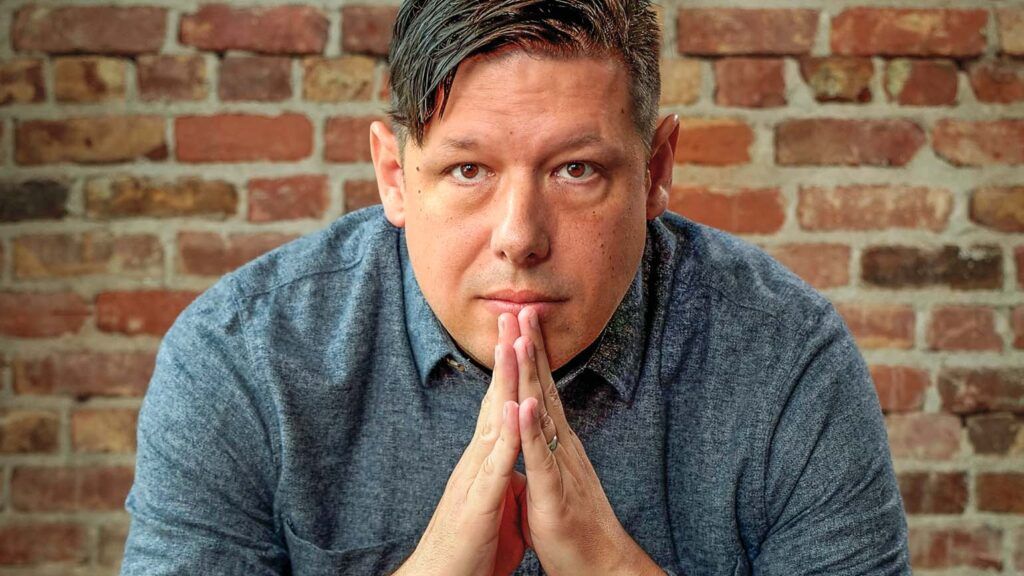When a senior pastor he’d worked with and respected told Elijah Stephens he was seriously questioning his faith, it hit Elijah hard. “I’ve probably prayed 500 times for a church member to be healed,” the pastor told Elijah. “Not once have my prayers been answered.” Their talks raised a lot of questions for Elijah. Does God still heal the sick? Do miracles still happen? Does prayer matter? Where was the evidence? Elijah felt driven to find answers. Over the course of five years, he traveled across the country, interviewing people who believe they’ve experienced miraculous healings. He also talked with doctors, scientists, theologians and skeptics. Elijah’s findings have recently been released in a documentary called Send Proof. He spoke with Mysterious Ways about his quest.
Why did your senior pastor’s doubts affect you so strongly?
We were best friends. We did ministry on the streets that was miracle-focused. We prayed for people together. He was pretty much the last person I would have ever expected to question the reality of miracles. If he, a man who’d devoted his life to his faith, didn’t believe in miracle healings, then were miracles real? I had to know.
So you went looking for evidence of miracles. But isn’t that the opposite of faith?
There is a feeling that wanting proof or being too intellectual separates us from the Holy Spirit working within us. I totally reject that. Church history is full of people who were fully engaged with their intellect and had powerful encounters with God.
We’re called to worship God with not only our hearts but also our minds. In my opinion, deeply researching and identifying true healing miracles glorifies God because it further encourages people to pray, no matter how hopeless a situation seems. It reminds us that nothing is impossible with God. That’s something we all need to be reminded of, even longtime ministers.
For the purposes of your research, how did you define what a healing miracle was?
I was looking for stories of people who were healed in a way that medical science couldn’t explain, as well as people who were healed soon after they were prayed for. Prayer was important to my research because it served as evidence that God was asked to intervene. I relied on an organization called Global Medical Research Institute (GMRI), which researches people’s claims of miracles for the possibility that the healings could have a natural explanation. The ones I looked into had none.
What can healing miracles teach us about other miracles?
The reason I chose to study healing miracles is that they are quantifiable. You can see that a patient had a medical problem that was resolved without any explanation. This provided evidence that it wasn’t just good fortune, which you can’t really show in other miracle cases; for example, when someone gets a heaven-sent new job. For someone who might be skeptical about the validity of miracles, healing miracles offer trackable evidence of God at work. They can give us assurance that God is working in other parts of our lives as well.
What was the most remarkable miracle healing you learned about in your research?
Chris Gunderson’s healing. He could only eat through a feeding tube because of an incurable stomach disorder. In 2011, when he was 16, he went to a worship service and was prayed over by a man named Bruce Van Natta. Chris felt a feeling like an electric shock move through his body. That evening, he ate an entire meal for the first time with no issues. Doctors had no explanation. He hasn’t used a feeding tube since. But here’s what’s even more interesting. Bruce Van Natta had experienced his own miracle healing four years earlier, when a semitruck he was working on fell on him, crushing his entire body. During surgery, doctors were forced to remove so much of his small intestine that it was thought he wouldn’t survive long post-op. But soon after someone prayed for his healing, he experienced a rejuvenation of his small intestine, which left his doctors dumbfounded. Bruce quit his mechanic job to become an evangelist. He’s been quoted as saying his miracle is small compared to the miracles he’s witnessed as a result of sharing his testimony. It’s possible to attribute an individual case of healing to a natural but unexplainable event. But to see the way God used Bruce’s healing to continue to reach others, through sharing his story and through participating in prayers that led to more healings—to me that’s incredibly powerful.
What would you say to people who think that a lack of a medical explanation still isn’t conclusive proof of God’s involvement in someone’s healing?
It’s important to remember that for this project, I specifically looked at cases where prayers were said not long before the miracles happened. They didn’t just happen on their own. It’s difficult to deny that there’s a connection to prayer, a divine response.
Some people you spoke with said they would be convinced of miracle healings only if there was a way to scientifically study the outcomes of prayers, as in a double-blind study. Is that reliable proof?
I don’t think that’s a great way to study miracles at all. You can’t expect to replicate God’s actions in any kind of study. We should consider studying miracles the same way we look for proof in legal cases. We look at the data, we interview witnesses and we decide what is most believable.
Anecdotes are powerful, but did you find any evidence for healing miracles that did involve more controlled observation?
Candy Brown, professor of religious studies at Indiana University and co-founder of GMRI, went to Mozambique in 2009 with the missionary Heidi Baker, who was hosting a faith healing service. Many of the people in attendance had visual and hearing impairments. Candy administered vision and hearing tests for people as they were entering Baker’s services and then tested them again after Baker prayed for them. Candy found dramatic improvement in participants’ eyesight and hearing. One participant who couldn’t read the eye chart at all before could read part of it after being prayed over. These are findings that have been published in a peer-reviewed medical journal.
What do you tell people who feel as if their prayers didn’t get answered?
I tell people it’s always God’s desire to heal in this life or in heaven. I remind people that they might not receive physical relief when they pray for healing, but that doesn’t mean God isn’t answering their prayer. God sometimes answers our prayers with a spiritual or emotional healing that helps us better address the challenges we are going through—both physical and otherwise. I’ve heard of God doing incredible things with people’s lives when they say, “God, I’m not trying to treat you like one of those jackpot machines and get something out of you. I’m giving my whole self to you, and I’m trusting Christ to use my life.”
Can you give us an example of someone like that?
Yes, Marolyn Ford. I found her experience incredibly inspiring. At age 18, she was diagnosed with juvenile macular degeneration, an eye disease that causes progressive vision loss. The doctors told her there was nothing to be done. No surgery or medication or glasses could restore her sight. She was devastated and prayed for a miracle, but her prayers, it seemed, were unanswered. She trusted that God had a plan for her life whether or not her vision returned. She never lost faith in God’s ability to heal, and kept praying for her sight to return if it was God’s will. In the meantime, she continued to live a full life. She learned to read braille and walk with a cane. She graduated from college, and it was there she met her future husband. Her husband joined Marolyn in her continued prayers for healing, with still no change. Marolyn went on to earn a doctorate degree. One night, after she’d been blind for 13 years, Marolyn’s husband prayed again for God to restore her sight. While he was still praying, Marolyn’s sight was restored. She clearly saw her husband kneeling before her. Today, almost 50 years later, her vision remains intact. GMRI examined her medical records and consulted with experts. There’s no question that her sight was restored and no medical explanation for how it happened. Marolyn went on to become an evangelist, and her testimony brought many people to Christ. I can’t answer why she had to wait 13 years for her healing, but there’s no doubt that God was at work in her life.
There’s a belief that miracles are rare occurrences. Did your research bear that out?
While miracles aren’t necessarily common, data shows that they do happen more often than we might think. A CBS News poll found that 35 percent of Americans say they have personally seen a miracle. That’s some 100 million people. Another survey found 73 percent of U.S. medical doctors believe miracles can occur today. So I think we’re often simply not aware of all the miracles that are happening.
How did your research affect your own faith?
In the documentary, I talk about how I was abused as a child. As an adult, I suffered from severe PTSD. Hearing these testimonies of God at work helps me trust God in my own life. In a way, the research helped me find my own healing.
For more inspiring stories, subscribe to Mysterious Ways magazine.





